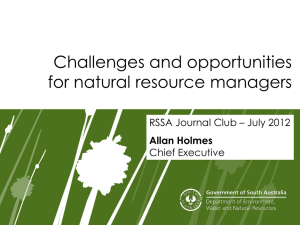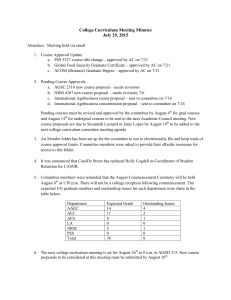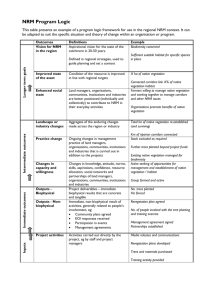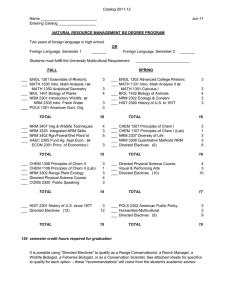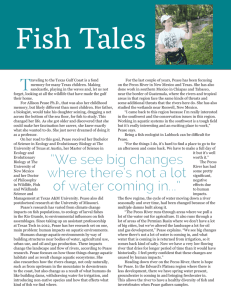Meet Our New(er) NRM Faculty Information & News for Prospective
advertisement
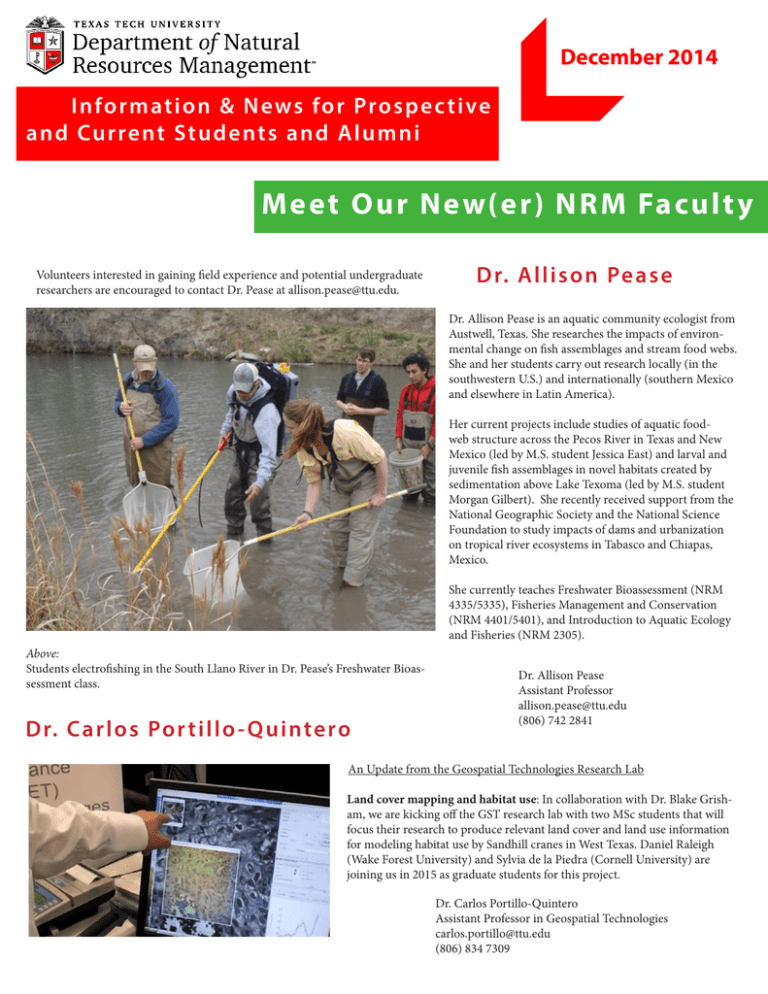
December 2014 I nformatio n & News fo r Pro sp e c t i ve a n d Current Stu d ents an d Al um n i M e et O ur New(er) NR M Fac u lt y Volunteers interested in gaining field experience and potential undergraduate researchers are encouraged to contact Dr. Pease at allison.pease@ttu.edu. D r. Al l i so n Pe as e Dr. Allison Pease is an aquatic community ecologist from Austwell, Texas. She researches the impacts of environmental change on fish assemblages and stream food webs. She and her students carry out research locally (in the southwestern U.S.) and internationally (southern Mexico and elsewhere in Latin America). Her current projects include studies of aquatic foodweb structure across the Pecos River in Texas and New Mexico (led by M.S. student Jessica East) and larval and juvenile fish assemblages in novel habitats created by sedimentation above Lake Texoma (led by M.S. student Morgan Gilbert). She recently received support from the National Geographic Society and the National Science Foundation to study impacts of dams and urbanization on tropical river ecosystems in Tabasco and Chiapas, Mexico. She currently teaches Freshwater Bioassessment (NRM 4335/5335), Fisheries Management and Conservation (NRM 4401/5401), and Introduction to Aquatic Ecology and Fisheries (NRM 2305). Above: Students electrofishing in the South Llano River in Dr. Pease’s Freshwater Bioassessment class. D r. Ca rlos Po r tillo - Q u inte ro Dr. Allison Pease Assistant Professor allison.pease@ttu.edu (806) 742 2841 An Update from the Geospatial Technologies Research Lab Land cover mapping and habitat use: In collaboration with Dr. Blake Grisham, we are kicking off the GST research lab with two MSc students that will focus their research to produce relevant land cover and land use information for modeling habitat use by Sandhill cranes in West Texas. Daniel Raleigh (Wake Forest University) and Sylvia de la Piedra (Cornell University) are joining us in 2015 as graduate students for this project. Dr. Carlos Portillo-Quintero Assistant Professor in Geospatial Technologies carlos.portillo@ttu.edu (806) 834 7309 Tropical deforestation mapping and modeling: With the support of the Tropi-Dry Collaborative Research Network (http://tropi-dry. eas.ualberta.ca/) for the period 2015-2017, we will start a research program for understanding the dynamics of tropical dry forest loss and regrowth in Central America and the Caribbean. Opportunities for Graduate Research Assistantships and Undergraduate Research in this subject will be available. More information will be posted in this newsletter on 2015. Software: In addition to ArcGIS and ERDAS Imagine, we now have Idrisi Selva (Clark University) and ENVI (Exelis). These recently acquired software include a suite of powerful tools for satellite image processing and analysis. Idrisi Selva includes the Land Cover Change Module, a tool that allows land cover change detection and forecasting based on time-series data. Hyperspectral imaging: We recently acquired a Hyperspectral Imaging System capable of measuring spectral responses from 400 to 800 nm wavelengths at very high spatial resolutions (<5 mm). This instrument allows to observe Leaf-level changes in spectral response at high temporal frequencies (miliseconds) opening up exciting research possibilities in plant stress studies, ecophysiology and other applications. We will be setting up this equipment in our lab and starting lab and field experiments during 2015. D r. R obin Ver b le - Pear s o n Dr. Robin Verble-Pearson is currently an Assistant Professor of Fire Ecology in NRM. She began her appointment here in August 2012. Since that time, she has been starting new fire ecology research in the department, as well as actively rebuilding the prescribed burning program. In 2014, Dr. Verble-Pearson and her students assisted partners at Lubbock Lake Landmark, Texas Parks and Wildlife, and on private ranches with over 2700 acres of prescribed fire in the Texas Panhandle. These fires were implemented to improve wildlife habitat, restore native rangelands, and mitigate wildfire risks. Additionally, they provided valuable training opportunities for young wildland firefighters and future natural resources professionals. In 2015, she will be working with Dr. Brad Dabbert and the Quail Tech Alliance to implement prescribed burns on several private ranches with the goal of improving quail habitat. Dr. Verble-Pearson teaches Fire Ecology and Management (NRM 4304/5304), Environmental Science as a Social Pursuit (NRM 1300), and Prescribed Burning (NRM 3323). To keep up with her activities, you can follow her online at fireecologylab.blogspot.com or www.facebook.com/TTUfireecology or @TTU_FireLab. Top right: NRM students pose for a photo post-burn at the Matador WMA near Paducah, TX. Bottom right: NRM student, Cleaburn Nix, igniting a portion of a 900 acre prescribed burn at the Matador WMA near Paducah, TX. Dr. Robin Verble-Pearson Assistant Professor, Fire Ecology robin.verble@ttu.edu (806) 742 2841
